
Impact Update
Fourth Quarter 2023
Inspiring Climate and Change-driven Initiatives.
From climate action to nuclear disarmament, this quarter’s engagement initiatives tackled multifaceted challenges. In service of the climate crisis, we assessed our portfolio companies’ adoption of science-based targets. We also highlighted the need for clear frameworks in evaluating companies’ regenerative agriculture and biodiversity commitments, and we pressed companies to develop more comprehensive strategies to help further climate action. Additionally, through our Bond Fund-related dialogues, we reinforced the need to foster equitable and resilient housing amidst the effects of climate change.

We are pleased to be one of only eight asset managers to earn a top Morningstar ESG Commitment level ranking. Read More
The Domini International Opportunities Fund Investor Shares (RISEX) received ★★★★ Overall Morningstar Rating™ in the Foreign Large Growth Category as of 12/31/23, based on its three-year rating among 394 funds. Learn more about the Fund and methodology.
In this edition
Engagement Overview
Domini meets with company executives on its own and in collaboration with other investors to encourage stronger policies and practices on the issues that matter to us. In alignment with our standards, we seek improved disclosure, more responsible practices, and address emerging issues with our companies. Through constructive interaction – via letters, dialogues, shareholder proposals, and proxy votes – Domini communicates its expectations to companies and encourages innovation and business models that uphold respect for human rights while contributing to ecological sustainability and resilience.
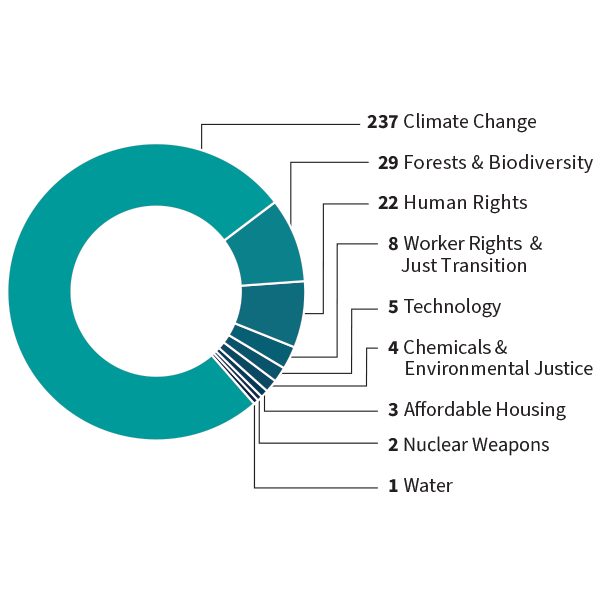
The UN Sustainable Goals (SDGs)
In the seven years since United Nations member states adopted the 2030 Agenda for Sustainable Development, the Sustainable Development Goals (SDGs) have been widely embraced by governments, civil society organizations, companies, and investors. The SDGs aim to address broad global topics such as poverty eradication, food security, protection of forests, sustainable cities and economic growth, gender equality, and climate change.
In each impact update, we’ll feature a few of our engagements alongside an investment highlight and show you which SDGs these are aligned with. Read more on the UN SDGs
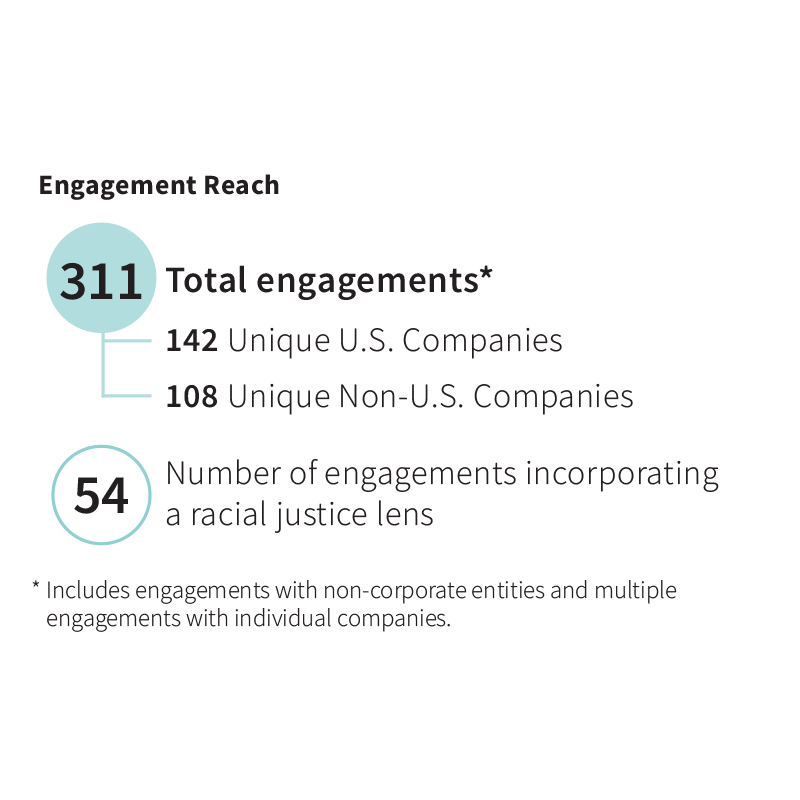
Encouraging Companies to Set Science-based Targets

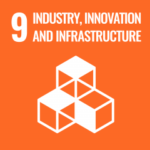
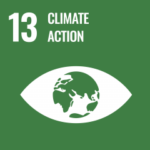
To limit global average temperatures from rising above 1.5°C, companies will be required to transform their business strategies while supporting a fair and equitable climate transition for all stakeholders. Setting quantitative, science-based greenhouse gas emissions (GHGs) reduction targets helps companies to communicate how much and how quickly they must reduce emissions to make this transition.
During the past quarter, we assessed companies held in the Domini Funds that have set or committed to setting science-based targets. Our preliminary results showed 42% of these companies had set targets and 14% had committed to set such targets. We wrote to 210 companies beginning with those in the industrial, utilities, materials, and health care sectors, encouraging them to set science-based emission reduction targets. The companies we contacted fit into three categories: (1) companies without targets, (2) companies removed from Science Based Targets initiative (SBTi) for not submitting their targets within two years of having committed, and (3) companies that committed to set targets, but which haven’t done so within a year.
In support of this goal, we also filed or co-filed shareholder proposals with three high-emitting companies in the transportation and logistics sector that do not have science-based targets for scope 1, 2, and 3 emissions. We were able to withdraw our proposal with C.H. Robinson after reaching an agreement about emission reduction targets.
Investment Highlight: Domini Impact Equity Fund
Eisai, a Japanese prescription medicine and over-the-counter pharmaceutical company, joined 6,500+ companies in embracing science-based targets via the SBTi. Aligning with climate science, Eisai pledges a 30% reduction in absolute scope 1 and 2 GHGs by 2030 from its 2016 baseline. Complementing this, the company has committed to a 30% reduction in the absolute scope of 3 emissions from purchased goods and services by 2030.
Advocating for Stronger Biodiversity Strategies

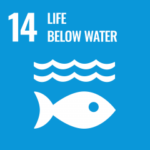
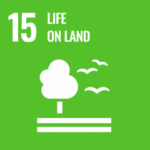
The pharmaceutical sector can be highly dependent on nature and biodiversity, where a unique tree bark or plant can be a critical component of a treatment or medicine. The need for companies to clearly identify specific context and location-specific impacts and dependencies, risks, and opportunities related to nature and biodiversity is crucial. In a recent engagement with GSK, we explored their use of the newly launched framework from The Taskforce on Nature-related Financial Disclosures (TNFD) including to understand the connection of its business to biodiversity and their overall approach to address its impacts and dependencies and mitigate harm. GSK emphasized the important role of suppliers in achieving their biodiversity strategy.
Looking beyond the pharmaceutical sector, we are strongly encouraging companies to initiate biodiversity strategies by assessing their specific impacts on biodiversity by geographical location. We filed shareholder proposals with International Paper and Home Depot requesting a biodiversity impact and dependency assessment using the TNFD approach, which may go to vote at the firms’ 2024 shareholder meetings.
Investment Highlight: Domini Impact Equity Fund, Domini International Opportunities Fund, Domini Sustainable Solutions Fund, and Domini Impact International Equity Fund
GSK is a multi-national pharmaceutical company engaging in the research, development, and manufacture of medicine. The firm is committed to creating a positive impact on biodiversity by 2030, ensuring 100% of its materials (agricultural, forestry, and marine) are derived in a sustainable manner. Biodiversity assessments for 80% of its sites were completed in 2022. The company prioritizes responsible sourcing for key materials, collaborates for sustainability, and invests in land use protection. Engaged in initiatives like the LEAF Coalition, GSK aligns its environmental goals with climate and water targets for comprehensive sustainability.
Encouraging Strengthened Commitments to Regenerative Agriculture

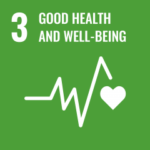

We are pleased to see many companies demonstrating leadership by setting regenerative agriculture commitments as part of their climate change and biodiversity strategies. But without a clear definition or framework to evaluate and measure progress, it is hard to put commitments into context and evaluate the impact.
We wrote letters to companies that have set regenerative agriculture commitments including Barry Callebaut, Campbell Soup Co., Compass Group, General Mills, Grupo Bimbo, PepsiCo, and Whole Foods to recognize their initiatives and gain more insight into the scale and proportion of the supply chain covered. We also want to understand the practices used, the outcomes sought, and how these efforts contribute to the overall climate strategies. While pilot projects are important for testing new approaches, having a comprehensive evaluation plan and scalability strategy are crucial. Ultimately, success will be determined by how effectively companies partner with farmers to ease transition challenges while aiming to maximize the benefits for people’s livelihoods. Learn more about regenerative agriculture.
Investment Highlight: Domini Impact International Equity Fund and Domini International Opportunities Fund
J Sainsbury, a UK-based food retailer, achieved 80% of its 2021-2022 sales from healthy or “better for you” products. In this same time period, 72.6% of its protein sales were from plant-based and meat-free products, of which 11.2% were entirely plant-based. The company runs a technical assistance program for farmers and suppliers, the Crop Action and Grower Interaction Group, helping promote sustainable crop production and sourcing and advancing best practices like pest management through alternative strategies such as planting disease resistant varieties and biological control. Additionally, J Sainsbury partnered with the Game and Wildlife Conservation Trust to better manage their resources.
The Role of Finance in Helping End Nuclear Weapons

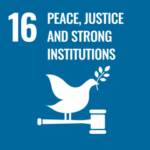
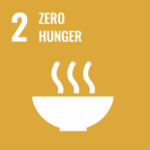
Image Source: Darren Ornitz, 2023
Nuclear weapons pose a great threat to humanity and the global environment, with their potential use being both inhumane and indiscriminate. Their use could put at risk all the issues we care about–human dignity, ecological sustainability, biodiversity, economic development, and food security, in addition to the harm caused to communities by their production and testing.
With the Treaty on the Prohibition of Nuclear Weapons entered into force in January 2021, nuclear weapons are illegal under international law. To recognize the significance of the Treaty to the investor community, we co-hosted an event at our office in New York with the International Campaign to Abolish Nuclear Weapons (ICAN). Investors and experts attended, alongside the second meeting of states parties to the Ban Treaty. We also spoke at a UN event hosted by the Government of Costa Rica on our approach to the issue and how we might foster collaboration to achieve the Treaty’s goals.
We don’t invest in U.S. Treasuries.
Our Impact Investment Standards exclude investments in nuclear weapons, including companies that manufacture nuclear weapons and U.S. Treasuries, which could potentially help maintain the U.S. nuclear weapons arsenal.
Investment Highlight: Domini International Opportunities Fund
Storebrand, a Nordic market leader in long-term savings and insurance, applies strict social and environmental guidelines to its investment products. The company does not invest in weapon development, production, or testing of controversial weapons. This is in line with, but not limited to the Convention on Cluster Munitions, the Ottawa Treaty, the Nuclear Non-Proliferation Treaty, and the Treaty on the Prohibition of Nuclear Weapons. The company also supports the EU in adopting a robust Corporate Sustainability Due Diligence Directive, demonstrating a dedication to responsible investments.
Inspiring Affordable Housing, Equity, and Climate Resilience

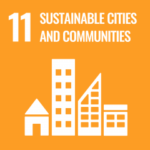

Amid increasing concerns around home pricing and housing affordability, we met with Fannie Mae to discuss what tools they can deploy to support home buyers. Acknowledging historical and persistent disparities in home ownership rates – where 44% of Black consumers, 51% of Latino consumers, and 73% of white consumers own homes – we encouraged Fannie Mae to prioritize efforts to close this gap and tackle historical housing access obstacles in order to help ensure equity.
Additionally, we sought to understand the intersection of the climate crisis with the enterprise’s efforts to foster resilient, equitable, and affordable housing. Fannie Mae shared information on their emerging climate risk modeling activities, which allow them to mitigate impacts and develop strategies to conduct education and outreach to build awareness among homeowners and renters. We urged them to develop approaches to maximize resilience, support a more just transition, and center equity. They are looking to understand how the climate risks and vulnerability of housing stock may disproportionately impact low income communities and communities of color, so that they’re able to address issues of affordability and equity in their approach to mitigating climate impacts on homeowners and renters.
Investment Highlight: Domini Impact Bond Fund
Fannie Mae has been providing affordable mortgage financing across the U.S. since 1938. The company offers free online courses for first-time homebuyers. Successfully completing the course qualifies people for assistance when buying their first home as well as post purchase counseling and foreclosure prevention. As part of its annual report, Fannie Mae includes assessments and reporting on climate-related risks informed by the Task Force on Climate-Related Financial Disclosures (TCFD).
Domini Impact Bond Fund Theme Allocations*


Access to Housing
Supports affordable mortgage credit & rental properties, multifamily collateralized mortgage obligations, and other residential mortgage backed securities.

Corporate Debt**
Supports corporate general obligations & bank loans of companies that meet Domini’s Impact Investment Standards.

Economic & Community Development
Supports nonprofit education, rural & agricultural communities, creative economy & public interest, transportation, access to water, business & job creation, and community development financial institutions.

Low-Carbon Transition
Supports renewable energy, energy efficiency and green buildings, sustainable cities, sustainable forestry and conservation, and corporate green and sustainability bonds.

Non-Housing Asset-Backed Securities
Supports commercial mortgage-backed securities, auto loans, and other asset backed securities that meet Domini’s Impact Investment Standards.

Health, Well-Being & Aging Society
Supports nonprofit healthcare and research facilities, housing and healthcare services, and pensions.
* Based on portfolio holdings as of 12/31/2023, excluding cash & cash equivalents, cash offsets, futures, swaps and options with the exception of short-term U.S. Agency bonds and Certificates of Deposit, which are reflected in this reporting. Numbers may not sum to totals due to rounding. The composition of the Fund’s portfolio is subject to change. Visit domini.com to view the most current list of the Fund’s holdings.
** “Corporate Debt” includes general-obligation corporate bonds, bank loans, and corporate debt not classified under other themes.
Regenerative Agriculture
A critical step in addressing climate change
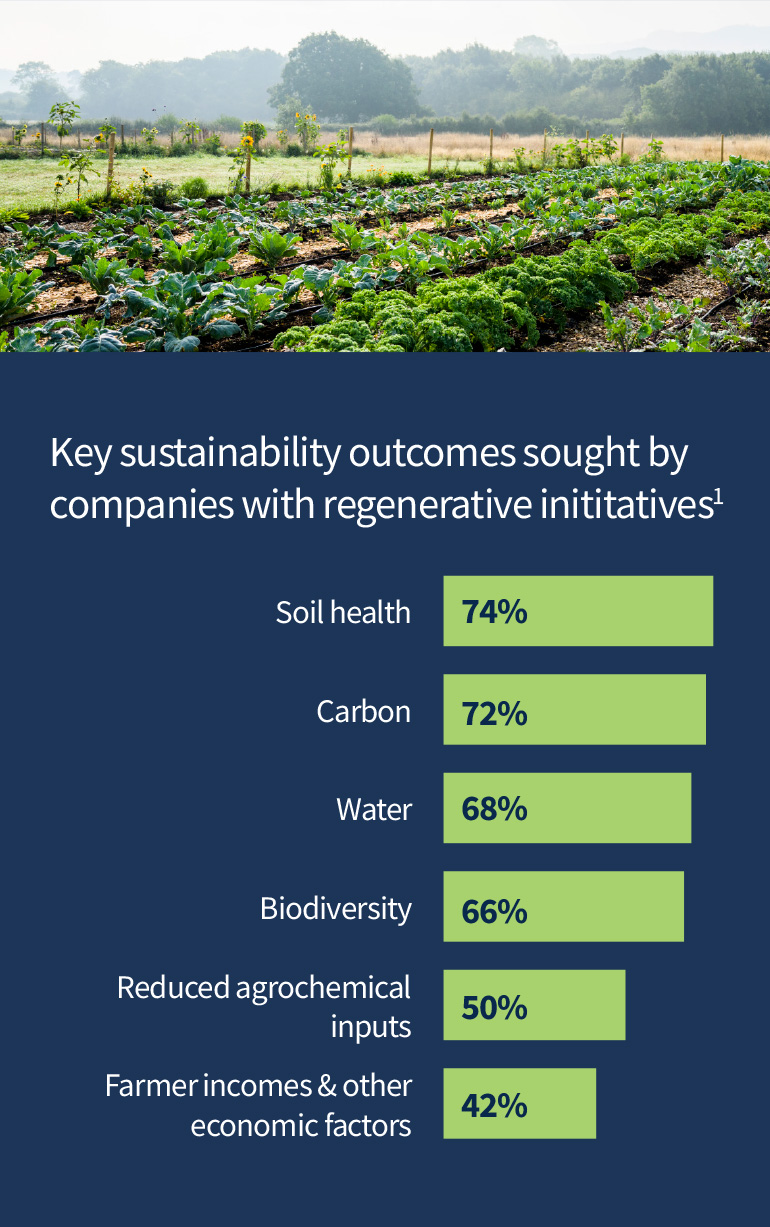
It is estimated that food systems account for approximately one third of total greenhouse gas emissions. Traditional or industrial agriculture practices are often carbon intensive, and emphasize maximizing yield, using chemical fertilizers, depleting soil health, and disturbing ecosystems. Improved land stewardship, shifting away from these harmful practices toward more regenerative ones, is therefore one of our greatest tools to mitigate climate change. The good news is that such initiatives can be successful, and the technology already exists to put this into practice to address climate change.
Many companies have begun to make regenerative agriculture commitments, recognizing its power and potential for helping them achieve their climate action plans. However, the term lacks a universal definition. A recent report published by the FAIRR initiative (FAIRR)1 evaluated 50 company commitments and found that while they share the goal to reduce the negative impacts of conventional production practices, there is little consistency in the approaches to delivering outcomes, for example in the wide range of tools used, such as cover crops, crop rotation, or agroforestry. Evaluating the impact of these programs, with the help of context, farm-, or landscape-level data, is vital. Discouragingly, FAIRR found that only 16% of the 50 companies discussed metrics and data.
Regenerative agriculture is a holistic approach designed for farmers to work in harmony with nature while maintaining and improving livelihoods. Farmer uptake, training, and incentives to help farmers participate in these programs are crucial. Companies could do more to prioritize the benefits that can be achieved for farmers producing their food stuff. For example, they could improve farmers’ livelihoods by doing things like diversifying incomes through the planting of a variety of crops and reducing costs. The FAIRR Report displayed that only 24% of the 50 with commitments studied had a holistic strategy covering all six expected outcomes. A holistic approach, which recognizes the interactions between practices, is necessary to avoid negative externalities.
Though regenerative agricultural practices present attractive opportunities and could significantly help mitigate climate change, achieving positive outcomes can take years and require long-term commitments and financing. Companies must pledge to deploy each of the practices appropriate for the crop or ecosystem for all potential regenerative agriculture outcomes to be realized. In essence, this approach requires a business model transition away from unsustainable, yield-maximizing practices toward those that foster long-term resilience. It is also important to see how it relates to and supports a company’s overall climate strategy. Stakeholders need more accountability, increased monitoring and measuring, and clearly defined outcomes and approaches to achieve meaningful impacts. While it is not a simple undertaking nor a silver bullet to helping resolve the climate crisis, it is an achievable step in the right direction.
1. The Four Labours of Regenerative Agriculture, FAIRR (September 2023)
Domini News
Seeking to harness the power of finance to create a better world encompasses a variety of aspects. From innovative approaches to sustainability to the role of investors in addressing nature and biodiversity loss, we cover a range of topics that highlight the intersection of finance and environmental stewardship.

Domini Receives Morningstar Recognition
The Domini International Opportunities FundSM Investor Shares (RISEX) received ★★★★ Overall Morningstar Rating™ in the Foreign Large Growth Category as of 12/31/23, based on a three-year rating of four stars among 394 funds.
We are also pleased to be one of only eight asset managers, out of 108 firms, to earn a top Morningstar ESG Commitment level ranking. Morningstar introduced the ESG Commitment Level for Asset Managers assessment in 2020, making this Domini’s first time being included in its qualitative rating. Watch Carole Laible, our CEO, discuss the recognition at domini.com/esg

Sharing Perspectives on Boreal Forests and Wildfires
In one of our most widely read pieces this year, our team engaged in a compelling discussion about the boreal forests and the recent wildfires that captivated global attention. The conversation sheds light on the factors behind the wildfires in Canada’s boreal forest fires and their ramifications on regions across the U.S. Read more at domini.com/boreal

Aligning Investments with Values: Nature Action 100
Nature Action 100 aims to align corporate goals with the need to address nature loss, fostering cooperation between investors and companies. This initiative highlights the importance of nature in business and encourages shared environmental responsibility. Learn about Domini’s role and recent activities in the initiative at domini.com/nature100
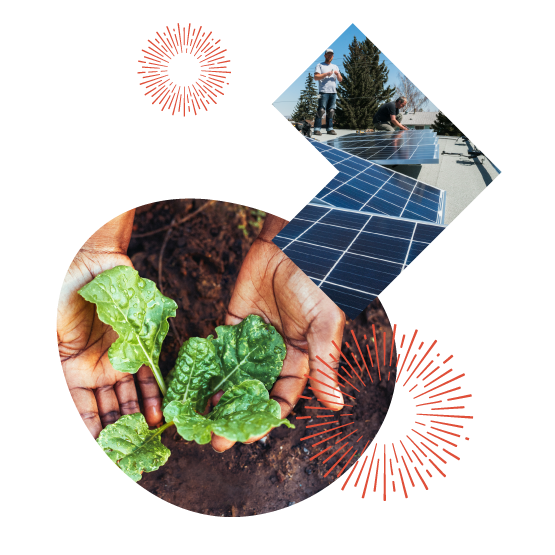
The secret to making an impact is small.
It starts by subscribing to news and updates.
